#nanowrimo help
Text

Deciding to participate in NaNoWriMo can be exhilarating, but deciding what exactly to write is often daunting. Whether you'd like help with a specific aspect of your story, or if you're unsure even of what genre to write in, using a writing prompt can be an enormous help.
As someone who has participated in NaNo multiple times, I understand what you're going through. Listening to guidance from the spirit realm can help ensure you get the most out of your experience, and can also help you set yourself up for success.
Available on Etsy here.
Learning tarot | Daily Tarot so far | Tarot crash-course | Tarot vocab | main blog | main Etsy | use FROMTUMBLRWITHLOVE for an additional 10% off
#nanowrimo#writing prompt#fanfic#writeblr#november#fic#writing#etsy discount#tarot readings#tarotblr#witchblr#tarot community#etsy#shopping#discount#witchcraft#divination#fortune telling#tarot#op#bookblr#ao3#national novel writing month#nanowrimo help#nanowrimo prompt#prompt
2 notes
·
View notes
Text
Ok. My fellow writers. I need HELP.
NaNoWriMo is not going well lol but I know why and just need help getting over a hump.
Basically for 3 years, I’ve been trying to write a novel. I had one idea that I wrote like 100+ pages for but there were some plot flaws and holes I’ve been trying to work through in between breaks and lack of creativity and focusing on my fanfics, etc. We’ll call this storyline #1.
BUT THEN… I had a high thought in the shower that blew my mind and I can’t get rid of that is like more fantasy focused - like a whole different world building/creation. Let’s call that storyline #2.
So for NaNoWriMo, I tried to a Frankenstein combo thing to bring them together to satisfy the story I’ve worked on for three years while exploring this new idea - storyline #3. And I’m making no progress cause that isn’t quite right?
So all that to say… has this happened to anyone else lol maybe not with a novel but with just stories in general and how do you work through it? Like how do you force yourself to commit to one overall vision and world? I feel like I’ve never had this happen? Usually I have one specific idea and maybe alternate endings I need to decide on.
But right now, Im realizing I can’t write because I literally can’t pick an overall vision? I can’t tell if there’s a way to explore all of it cause they are close?? But different?? So I gotta take like 10 steps back to move forward which is fine. But like… how??? Lol any advice??
My fic universes are FAR easier 😭😂 lolol
3 notes
·
View notes
Text
can people who have done/ are doing NaNoWriMo tell me…what counts in the word counting…like if I write the blurb or rewrite something does that not count? Is it only words that haven’t been written down? Because technically someone could rewrite one chapter a bunch of times until they’ve “written 50,000” but also a lot of people are in the rewrite stage of their novel like me where they are going in for their second draft
3 notes
·
View notes
Text
free resources to write a novel in 2024
hello hello! it's me, rach!
as the new year approaches, many of us set goals and resolutions - myself included. one of my goals for 2024 is to write a novel (I've been procrastinating on this for quite a long time now). i assume that some of you might have the same goal, that's why I'm writing this post today.
over 2023 i've been releasing some freebies for authors just like me, so I thought I could compile my favorites in this post. hope you find this useful :)
1) the writer's workbook
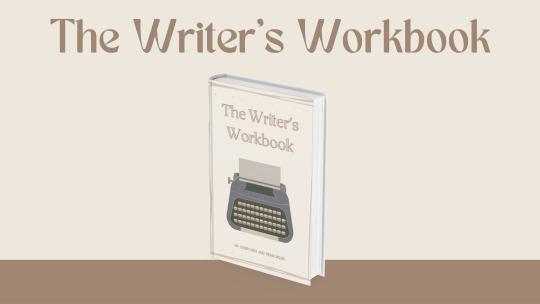
this workbook has over 60 exercises to help you develop characters, scenarios, etc. if you're ever stuck, I'm pretty sure this workbook will be your best friend.
2) author's corner (notion template)
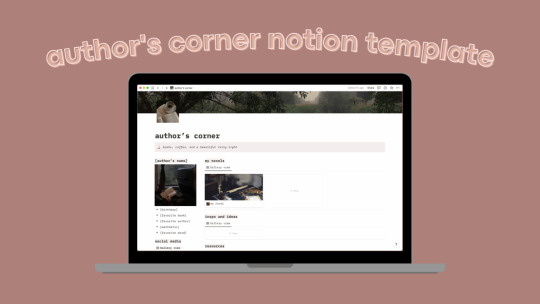
this is the most downloaded freebie in my shop! it is a notion dashboard with everything you need to organize your writing and has some templates included (like scrivener)!!
3) another notion template
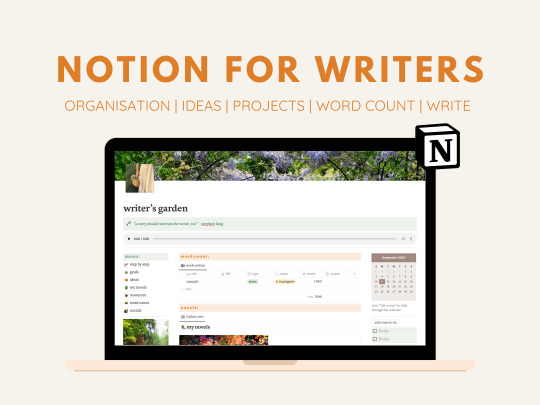
this one has two themes you can choose from: cottage-core and dark academia. they're very similar to the previous template, but this one is more recent and I added some new features. feel free to explore both and pick the one you like the most.
4) the author's journal
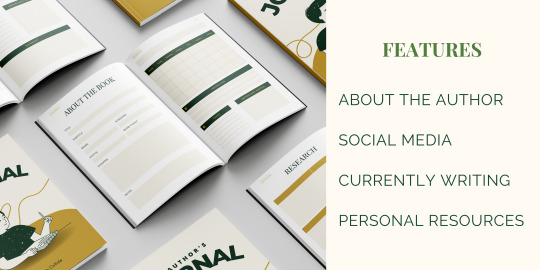
this is a cute printable with 20 pages that will help you stay on track and manage your social media accounts as a writer who shares their work online. you can also register what you're currently writing and your personal research and resources.
5) plan your book printable
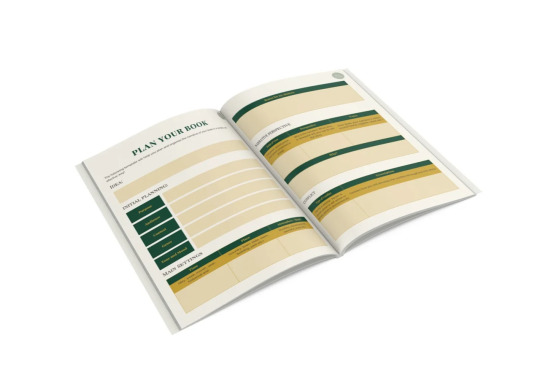
this is a 6-page printable for you to fill out and plan your book easily and effectively.
6) excel sheet to organize tasks & word-count

this is a simple excel sheet, but it is very effective for keeping track of your tasks & word-count of your novels. also, it is 100% customizable to your liking!
that's all for now! feel free to explore my gumroad shop where I have plenty of freebies to grab! also, don't forget to subscribe so that you never miss any opportunity to get a goodie for free :)
hope this post was useful!
have a nice day,
rach
#writing resources#writing#writeblr#writer tips#writing advice#writing help#writing tips#poetsandwriters#resources#research#wattpad#nanowrimo#creative writing#writerscommunity#writers#writing inspiration#writing prompts#writing reference#writerslife#writersofinstagram#software#inspiration#writing inspo#for writing#for writers#for whoever needs it#writing research#researching#we love an useful post#useful
4K notes
·
View notes
Text
Vary your language with synonyms to use instead of "said"
While there is nothing wrong with the word "said" in and of itself, variety is the key to exciting writing that keeps readers engaged.
Combining action beats with varied synonyms as well as "said" yields the most interesting and varied results.
Here are some examples you can use in your next project to keep you writing varied:
Instead of "said quietly"
whispered
murmured
muttered
croaked
purred
hissed
crooned
breathed
buzzed
Instead of "said affectionately"
admired
gushed
praised
flattered
lauded
beamed
complimented
approved
exalted
Instead of "said sadly"
sobbed
cried
lamented
pleaded
wept
grieved
wailed
sniffled
bawled
Instead of "said angrily"
growled
fumed
demanded
hissed
scolded
mocked
yelled
bellowed
berated
Instead of "said fearfully"
stuttered
gasped
stammered
gulped
cautioned
screamed
wavered
croaked
blanched
Instead of "said excitedly"
cheered
sang
beamed
rejoiced
hailed
exclaimed
celebrated
exulted
blurted
Instead of "said uncertainly"
inquired
hesitated
balked
deferred
speculated
floundered
pondered
wavered
vacillated
Neutral synonyms to use instead of "said"
voiced
expressed
insisted
noted
uttered
continued
replied
went on
began
#nanowrimo#writing tips#writing advice#writing help#novlr#synonyms#writing dialogue#writers#writing#creative writing#creative writers#creative inspiration#writing resources#writing community#authors#writing fiction#writing books#writeblr
6K notes
·
View notes
Text
NaNoWriMo Advice/Resource List
Though I am not participating in NaNoWriMo this year, I know that many of you fellow writers and readers might be doing so!
Linked below are blog posts I’ve written about my past NaNo-related experiences, and I hope that by sharing these, they will be of use to you! Happy writing, and good luck achieving your NaNoWriMo goals!
Things I learned in Camp NaNoWriMo July 2020
Camp NaNoWriMo April 2020: My journey, and what I learned while writing.
I Won NaNoWriMo 2021!
#nanowrimo#nanowrimo help#writing help#writeblr#nanowrimo resources#nanowrimo 2022#nanowrimo blog post#nanowrimo post#claris speaks#writing resources
1 note
·
View note
Text
tips for setting the scene
it’s easy to get caught up in dialogue or a character’s internal dialogue and forget altogether that they, too, exist in their own physical world. as authors, it’s primarily our job to convey the exact amount of information: the reader is on a need to know basis, but they also need to know enough to draw their own conclusions. i’ll admit, it’s a difficult task, but here are some tips to help set a scene:
- imagine the world from the eyes of your character: how do they see things? do they see the big picture first or are they drawn to smaller details that others don’t often notice? what’s pulling their attention away from the action or their own thoughts?
- breathe life into your scenes: i don’t mean the english teacher’s equivalent of “the curtains were blue means that the character is sad.” i’m talking about the blue filter in Twilight that conveys the “constant cover of clouds and rain” and the shift from the Arizona desert to the cool Pacific Northwest. think about all the small details that convey information about a scene and allow the readers to make inferences. if the character walks along a street and the yards shift from overgrown hedges with frayed yard chairs and a birdbath containing a mini swamp to yards with freshly cut grass with white picket fences and ornate wreathes hanging on the doors, you’re providing all of the details for readers to make an inference. context is needed, too, but that will be provided in the whole of your novel or short story. don’t be afraid to provide details and use figurative language.
- spread out your details: did you feel bombarded in the last tip? i provided a lot of details quickly, all at once, without spreading them between action, dialogue, or internal dialogue. i’m not going to stop you from being the next J.R.R. Tolkien if that’s how you like to write, but try not to overwhelm the reader with details all at once. it will feel more natural if you spread things out and allow the reader to feel as if they, too, are with the character in their environment. this is more of a stylistic tip, so take it with a grain of salt and think about what will work best for your novel. always go back to that and to what your character is seeing. how is this all playing out for them? how can you put feeling into the scene?
- place your characters within the scene: where are they in their environment? how are they interacting with the people or objects in it? what do they think about these things? you don’t need to tell the reader everything your character does, but provide enough information so that we don’t get lost in their movement or stagnation. it helps to have someone else read your work if you’re struggling with this part. if they’re lost as to where the character is or what they’re doing, chances are a good portion of your readers will be confused, too. check out your prepositions. are there too many? too few? use them, but don’t abuse them.
happy writing! if you need help setting a scene or have any questions, our ask box is always open!
#writing advice#writeblr#writing#writing tips#write it#nanowrimo#novel writing#creative writing#writers block#writing help#writing prompts#writing warm up#writers on tumblr#books and novels#writing tools#fiction#writers of tumblr#fiction writing#novel editing service
3K notes
·
View notes
Text
Nanowrimo? Fuck 'em. We don't need 'em.
Hey, friends. Writers. All of us who grieve thanks to Nanowrimo.
WE have always been the heart of it.
Nano was a platform. A tool. It's a tool that broke.
WE ARE STILL the same people who write in November.
It's not over. Grieve, rage, and keep going.
56 notes
·
View notes
Text
I am neither doing NaNo nor skipping NaNo, but a secret third thing...
2K notes
·
View notes
Text



#sleep token#vessel sleep token#vessel#photography#song alkaline#more of the photos taken at the alkaline mv filming location#because this idea of vessel living in a derelict jacobean manor has consumed me#why am i like this#i hate it#im tired#i've already plotted this entire fanfic out#send help#good thing nanowrimo is just around the corner#said nobody ever
187 notes
·
View notes
Text

I can't believe I finally found a collaborative writing program that aligns with my values and is browser based and it was because Nanowrimo tried to make AI money in the stupidest way possible. Shout out to Ellipsus, I hope your servers don't get slammed over all of this so I can figure out how to use your program
#ellipsus#thanks nanowrimo. i guess#writing#Fuck AI all my homies hate AI.#“but I use it for” I hope the server housing your LLM gets shot into the sun! :) hope this helps
31 notes
·
View notes
Text
How to Build a Sustainable Writing Habit Through SCIENCE (Fuck Off, NaNoWriMo)

This is a lightly edited repost from a previous post on my mostly-defunct blog, topazadine.com. I feel like it's an excellent thing to highlight now that everyone's wondering what the hell do to after NaNoWriMo showed their ass as anti-creative idiots.
I have never liked NaNoWriMo and think, frankly, that it is a garbage tool for new writers. If you've done it and enjoyed it, that's great, but overall, it is not the best way to build motivation. At all.
But why is NaNoWriMo so bad? (Other than the current controversy.)
It encourages younger writers to think of writing as something they do during the months of October through November. Not something they do all year round, day in and day out. People will prep for weeks to do a whole novel in one month and hinge all their writerly hopes on that one singular month.
We won't even get into the fact that November is the absolute shittiest month to try to get a novel done because the holidays are coming up, and many working-class people are busting their asses off to get extra hours in before Christmas.
Writing is something you do all. the. time. It is not bound by a singular month. It is not limited to a certain time of year. And when you are working to complete a draft, it doesn't matter season it is. What matters is that you get it done.
So let me show you something better. But first, why should you listen to me? And why is my method an improvement over a shitty organization's AI-riddled contest?
I wrote the first draft of my novel, Poesy (104,323 words) in 39 days.
That’s an average of 2,647 words per day. It is also about twice as much as the typical person aims for during NaNoWriMo. I did not set out to get it done in any given time period, but I still completed way, way more than NaNoWriMo would require in just about the same amount of time (plus 9 days).
I didn't have a buddy group. I didn't have checkins. I just had me and my keyboard and my secret weapon, which I'll show you in a bit.
How is it possible to get so much more done without that external motivator?
Simple: I compete with myself.
You Need to Develop Intrinsic Motivation
What in the world is intrinsic motivation?
Intrinsic motivation is defined as the doing of an activity for its inherent satisfaction rather than for some separable consequence. When intrinsically motivated, a person is moved to act for the fun or challenge entailed rather than because of external products, pressures, or rewards.
Frontiers in Neurobiotics
That is, in essence, what we do when we’re writing for fun; or, rather, it should be what we’re doing when we write for fun.
A lack of intrinsic motivation is why people who see novels as a get-rich-quick scheme tend to burn out when they realize that most writers make less than minimum wage. That's called extrinsic motivation, and it doesn't work well for things like writing, where there may not be any easily-defined goals or motivators. Most of us are not going to become rich from our writing.
Here's why extrinsic motivation is unhelpful:
Extrinsic motivation does not always work best; sometimes it can make us perform poorly at certain tasks.
For instance, studies reveal that high stake rewards, like cash bonuses, can hinder cognitive capacity. This happens because they shift our focus away from the task and onto the outcome. We can become preoccupied with rewards and all the things that come with them, such as our social status, instead of just doing the work.
Extrinsic rewards also tend to narrow our focus on a defined goal and reduce our ability to see other possibilities, hindering creativity. Studies find people perform worse on tasks requiring imagination and ingenuity when they are offered extrinsic rewards, such as higher pay.
Nir and Far
And, well, note that "performing worse on tasks requiring imagination and ingenuity." Extrinsic motivation is literally the WORST motivator for writing specifically.
NaNoWriMo is extrinsic motivation, which is not anywhere near as powerful or sustaining as intrinsic motivation. You want to get the shiny achievement award, so you just bang out 50,000 words of slop because you want to say you did it.
You're not motivated by anything but the outcome. That does not a sustainable writing practice make.
But there’s something about intrinsic motivation I want to highlight, because it’s crucial to what I am about to show you: the challenge.
Sometimes writing is a total slog because we’re worrying about all the other things and not on the words themselves. We’re fussing about whether we will ever get published, if we’ve added enough tension in a certain part, if our mom is going to read our porn and realize what a freak they raised.
You cannot think about those things while actively writing.
Instead, you need to focus on the writing process itself. John Schinnerer, a psychologist and life coach, explains further:
Remember as you are in the process of achieving your goals that the enjoyment comes from the doing not the attaining. It is important to find contentment in the act of pursuing the goal while placing less weight on the actual fulfillment of the goal itself.
PsychCentral
So we know you need to find the challenge fun, and you need to focus on the act of putting the words on the page.
In other words, you need to make it a contest with yourself. Here’s how.
Use a Word Count Spreadsheet
Finally! We get to why I’m telling you this! It's free, it's easy, it can be done all year round.
A daily word count spreadsheet is an amazing way to stay motivated and to keep pushing yourself to write because you can literally see the wins rack up. Every day, the word count jumps significantly, which can be much more motivating than just “oh, I’m at 8,453 words.”
More importantly, you’ll start to want to beat your “high score” from the day before.

I’ve highlighted one of the cells so that you can see the simple formula that you need to set up: it’s just yesterday’s count minus today’s count.
Put that in one cell, then click and drag the bottom righthand corner of the cell, and it will populate the rest of the cells in that column with the adjusted formula (B4-B3, and so on).
This is very easy to create. All you have to do is copy-paste the wordcount from your document into your spreadsheet, make sure you have that super-simple formula, and you're done. I have severe dyscalculia and can still use it.
But you can see how much this really helped me:

Things started to really ramp up right at the end because I was getting so motivated by the word counts of the day previous. I wanted to beat yesterday’s high score and keep going.
At the beginning, I was writing maybe 1.9k words; by the end, I was an absolute demon, regularly breaking over 2.8k and then some. On the last day, when the rest of the family was in a post-Christmas hangover, my butt was glued to my chair, banging out those last few thousand words.
Psychologists and life coaches agree that self-competition, a type of intrinsic motivation, is one of the best ways to improve.
Michelle Gibbings, a workplace expert, explains:
When you compete with yourself, you don’t become fixated on what other people are doing; you set the direction and speed. You put yourself in the driver’s seat and control your progress, setting meaningful goals rather than focusing on the progress of others.
Michelle Gibbings
Making a word count spreadsheet like this is the definition of setting your own speed and controlling your progress. You can decide on a threshold you always want to hit and then feel very satisfied when you go beyond that.
I set my threshold at 1.5k words every day so that I didn’t feel bummed out when I had an off day and couldn’t get a lot done, but I really wanted my average to be around 2k, so I’d periodically check how close I was to that. If I had a terrible day or was busy, then I’d want to make up for lost time and write more the next day so I kept my average.
Now, I live a life that is quite advantageous to consistent writing: I’m single, I’m childless, I work from home, and most of my hobbies are pretty low-key.
Your life doesn’t look like mine, and that’s totally okay.
There’s no need to match the speed I showed here.
What matters is that your schedule works for you, and that you are consistent.
If you’re a caretaker or have a strenuous job, then set your threshold at just 100 words and aim for an average of 500. However, you’ll be sad if your spreadsheet has a blank cell, so you’ll want to get down at least something, even if you only have 15 minutes to write.
Plus, it’s so encouraging to see the word count go up day by day: much more satisfying than just seeing it in tiny font at the bottom of a Word document or Google Doc.
Or getting some dumb t-shirt from an organization that is actively trying to murder creativity for commercial gain. (Oh, and they protected an actual pedophile from consequences for months on end while he continued to groom children. But that was last year's controversy.)
There’s another reason why this particular method works so well for writers, though.
Word Counts Banish the Urge to Edit
You know you shouldn’t, but you do it anyway. A single word here. A removed sentence there.
The first draft is just about getting everything out, not fixing everything that needs fixing. That part comes later during your five billion revisions where you tweak every single word.
Revising means you have less to work with, which means you have less development. You can get rid of anything that shouldn’t be there when you’ve gotten to that very satisfying “The End” page.
If you are motivated by the spreadsheet method, then you are screwing yourself over if you edit.
Your word count went down! It looks like you did less than you did! You’re losing! Best add more, and fast!

(I had to include my placeholder chapter names; it was obligatory.)
Use strikethrough! Now you know exactly what you’ll be getting rid of when you get to the end of your draft, but you’re not decimating your word count. I removed the entire beginning of the book; that scene is super cute, though, so I later turned it into its own one-shot on my AO3 page.
I prefer doing that because then, if you find that you actually wanted to keep that scene or move it elsewhere, all you have to do is copy-paste from the old version, remove the strikethrough, and you’re all good.
So that’s my tool. It’s really that simple.
But even though it’s so simple, it works wonders for your motivation and consistency, which are crucial for a good writer.
Are you going to give it a whirl? You may find it nervewracking at first, but I encourage you to sample this method, especially if you have a hard time getting motivated.
And if you enjoyed this article, maybe you'll consider purchasing my debut novel, 9 Years Yearning.
This is not the book I drafted last year; it is in fact a prequel of sorts to that first novel. However, it helps set the scene for Poesy (the sixth book in the Eirenic Verses) so that you'll be all prepped for the masterpiece.
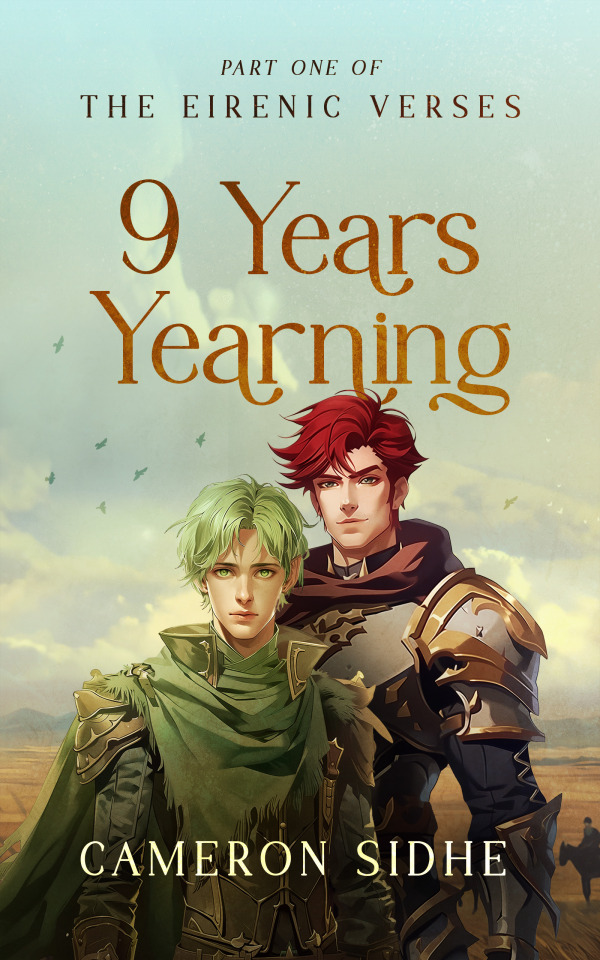
9 Years Yearning is a coming of age romance that follows the life of two young soldiers as they go from sorta-enemies, to frenemies, to friends, and then finally to lovers. It is a short read; you can probably finish it in about 2 hours all the way through. Perfect for a weekend romp.
If you do read my book, please don't forget to leave a review!
Reviews are essential to success on Amazon as they boost visibility. (Yes, even bad ones.) Always leave reviews, no matter how short, to support indie authors!
#nanowrimo#national novel writing month#writing community#tumblr writing community#writers on tumblr#writeblr#creative writing#writerscommunity#writer#writers of tumblr#aspiring writer#aspiring author#writing blog#fiction writing#writblr#novel writing#writer stuff#writing tips#writing a book#writing advice#writing tools#writing help#how to write#on writing#writing stuff#writing process#writing problems#writing is hard#writer problems#beginner writer
45 notes
·
View notes
Text
for any writers seeing this, what are your opinions on NaNoWriMo's statements regarding AI use?
Statement on whether or not AI is allowed
Statement on NaNoWriMo's overall position
#feel free to reply to this post or reblog with your takes#idk who said it but the phrase “why should I be be bothered to read something you couldn't be bothered to write” seems very applicable#like I get using chatgpt can be helpful for organizing your thoughts but i don't really know the mechanics behind it#and whether or not it's actually useful given that the data is plagiarized and can be VERY incorrect#tbf nanowrimo does recognize that using AI to write your novel defeats the purpose.. but then again like where's the bar?#I don't like seeing AI being used to generate content instead of an artist making art much like many people on this site#but i also recognize that with the right training data it could be super useful and genuinely a net good (like recognizing cancer cells)#will delete later#nanowrimo
37 notes
·
View notes
Text
The right FREE tools to write a book
hello hello, it's me!
today I was thinking of how much you loved my masterlist featuring some free tools for writers, and I thought I would do something like that again but, this time, featuring just one or two tools per step while getting the best of "the writer's workbook" (which is also free).
before going any further, for those who don't know, "the writer's workbook" is, as the name says, a workbook for writers, with over 90 pages. it has lots of sheets divided into categories, to help you build the skeleton of your novel. (know more about it here).
however, we can get the most out of it using other complementary tools to ease this process.
Brainstorming
Reedsy generator - it's one of my favorites, and it can be quite useful when you're stuck and want to get an idea. you're free to make changes to it so that it is as unique as possible.
Mindmap
Lucidspark - although it has a premium version, I find it so helpful when it comes to making a mindmap. I've used it multiple times before, including for college assignments, and it's one of the best I've found so far.
Mindmup - I'm sharing this one here as an alternative to lucidspark, since this one doesn't require to create an account, and you have access to unlimited maps. however, in my opinion, it is not as good or intuitive as lucidspark is.
Come up with names
Behind the name - it's a classic, but one of my favorites. you can search every name you could ever imagine, and get its meaning, history, variations, etc. it still has some tools you can use such as a name generator, anagrams, and much more.
Make a profile
Fake person generator - although it was not created for authors, you might find it useful since it gives lots of details and you can be interested in some fields.
Character generator - this one was made for writers, and is simple and easy to use.
Family tree
Family echo - it's so simple yet so helpful.
Maps
Inkarnate - it has a paid version, but you can use it for free and create a great map.
Politics
Filteries - this is sooo complete and accurate!
hope this was helpful! have a nice day <3
#writing resources#writing#writeblr#writer tips#writing advice#writing help#writing tips#poetsandwriters#resources#research#wattpad#nanowrimo#creative writing#writerscommunity#writers#writing inspiration#writing prompts#writing reference#writerslife#writersofinstagram#software#inspiration#writing inspo#for writing#for writers#for whoever needs it#writing research#researching#we love an useful post#useful
5K notes
·
View notes
Text
Three tricks to avoid plot armour
Plot armour can be difficult to avoid. We get so attached to our characters that hurting them in any way feels like a betrayal.
But plot armour is detrimental to any good narrative. Having your characters avoid harm, whether that be emotional or physical, means that there aren't any stakes. And without stakes, it's difficult for readers to invest.
There are three simple things you can use to avoid plot armour:
🔵 Injury
🔵 Sacrifice
🔵 Consequence
In every conflict, make sure the resolution contains at least one of these things.
If you don't want to injure your characters, make sure that they sacrifice something, whether that be someone, or an object. If they don't sacrifice anything, make sure there is a consequence. That consequence can be a loss, an emotional wound, or simply a blow to their reputation. The important thing is that your character doesn't remain unscathed by their experience, and they walk out somehow changed.
#nanowrimo#writers#creative writing#writing#writing community#writers of tumblr#creative writers#writing inspiration#writeblr#writerblr#writing tips#writblr#writers corner#plot armor#writing plot#plot bunny#writing resources#quick tips#writing quick tips#writing help#helping writers#help for writers#learn to write#advice for authors#writing advice#writing tips and tricks#story inspiration#let's write#how to write#writers on tumblr
2K notes
·
View notes
Text
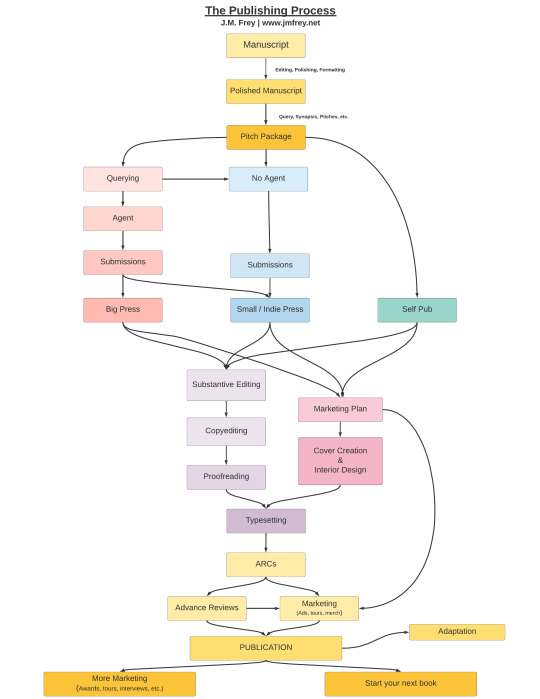
Lots of talk happening on Social Media lately about Trade Pub vs. Indie Pub vs. Selfpub (not that one is better than the other, just the advantages or disadvantages of whichever route you pick.)
So, I thought I'd share this again.
This is how a book goes from a manuscript to a published product, regardless of which type of publishing you do.
Note that if you have an agent or publisher, everything from "Submissions" downward, you will have support teams for (editors, proofreaders, marketing teams). Unless it's Indie/Small Press, in which case, much like querying, the submissions process is on you.
But if you selfpub, you have to do that all on your own (unless, like me, you hire cover artists, proofreaders, typesetters, etc.)
I've got some more information about Pitch Packages for Query/Submissions here, and lots more articles about the business and craft of writing here.
#words for writers#about writing#writing mentor#writing help#writing how to#writing#writer#querying#creative writing#nanowrimo#author#writing community#writing blog
99 notes
·
View notes